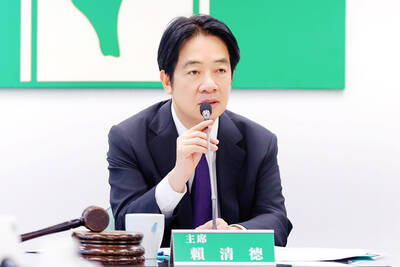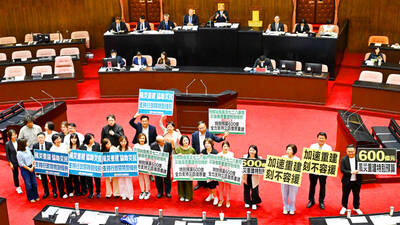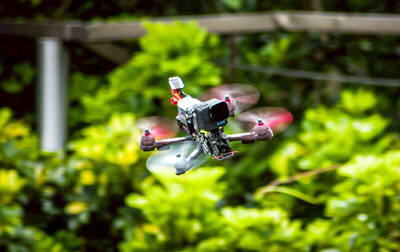In scenes reminiscent of a generation ago, Chinese are tapping friends and relatives traveling abroad to bring back electronic devices that are unavailable in China.
The irony is the object they desire is made in China and the US company responsible for the scarcity is proud of its free-thinking image — Apple Computers.
“The iPhone has brought back the planned-economy era,” said James Lei (雷雲), director of the consumer electronics division at market research firm In-Stat China.
More than a year after its debut, analysts say plans to introduce the smart phone are conspicuously more advanced in West Africa than in China, the world’s largest mobile phone market, with more than 600 million cellphone users.
Apple chief Steve Jobs said in June he expected to reach a deal in China this year and that the obstacles Apple had to overcome had to do with “regulatory bodies.”
Chinese media reported on Tuesday that China Mobile (中國移動), the country’s largest handset operator, was in the final stages of talks with Apple to launch the iPhone in China. But neither company would confirm it.
In the meantime, Chinese consumers are not waiting for Jobs. The country is widely considered the world’s biggest market for smuggled, “unlocked” and counterfeited iPhones.
More than 500,000 first-edition iPhones made their way to China, or nearly a tenth of the phone’s global shipments of 5.2 million from June last year through March, In-Stat said.
Some estimates showed that 40 percent of all “unlocked” iPhones are in China, telecoms consultancy BDA said.
Guo Yu, a 26-year-old computer programmer, asked a friend who was traveling to the US on a business trip in April to buy him an iPhone.
A three-step tutorial found on the Internet showed him how to unlock his phone so he could use it on his Chinese network.
“It’s so easy,” Guo said, adding: “I don’t care when the iPhone goes on sale in China.”
He paid 3,000 yuan (US$435) for an eight-gigabyte iPhone that sells for US$399 in the US.
Sellers on Taobao.com (淘寶網), China’s answer to eBay, are offering the eight-gigabyte model of the new 3G iPhone for 4,900 yuan, 3.5 times the US$199 US price tag.
“Limited units available for each buyer,” wrote one Taobao seller, whose ad featured long lines outside a US Apple store.
He claimed to ship the Chinese-made phones from San Francisco by courier.
Even when Apple does officially start selling the iPhone in China, the black market alternative might be more attractive.
The Ministry of Industry and Information Technology has asked Apple to de-activate the wireless Internet function on all handsets it sells in China, BDA said.
Another contentious point is China Mobile’s commitment to building a third-generation, or 3G, high-speed network using the homegrown TD-SCDMA standard, incompatible with the WCDMA standard the latest iPhone is based on.
The longer the delays, the more the black market eats away at the high-end customers Apple needs.
The iPhone’s price puts it out of reach for most Chinese consumers, but Apple would be targeting a profitable smart phone niche market that is expected to expand at a compounded annual growth rate of 26 percent to reach over 180 million units by 2010, BDA said in a report.
Apple also has to fend off Chinese iPhone clones, such as Meizu Technology Co’s (魅族科技) M8 MiniOne device.
The Guangdong-based company exhibited the US$200 iPhone look-alike at Germany’s CeBit fair in Hanover — until it was confiscated.
How to tell iPhones from copycats is one of the hottest topics on the Chinese fan site iPhone.com.cn.
The site is an indicator of China’s growing iPhone fever, with 300,000 registered users and thousands more joining weekly, said Zhang Xing (張星), the site’s editor.
In the meantime, Chinese consumers are not waiting.

President William Lai (賴清德) yesterday criticized the nuclear energy referendum scheduled for Saturday next week, saying that holding the plebiscite before the government can conduct safety evaluations is a denial of the public’s right to make informed decisions. Lai, who is also the chairman of the Democratic Progressive Party (DPP), made the comments at the party’s Central Standing Committee meeting at its headquarters in Taipei. ‘NO’ “I will go to the ballot box on Saturday next week to cast a ‘no’ vote, as we all should do,” he said as he called on the public to reject the proposition to reactivate the decommissioned

US President Donald Trump on Friday said that Chinese President Xi Jinping (習近平) told him China would not invade Taiwan while Trump is in office. Trump made the remarks in an interview with Fox News, ahead of talks with Russian President Vladimir Putin over Moscow’s invasion of Ukraine. “I will tell you, you know, you have a very similar thing with President Xi of China and Taiwan, but I don’t believe there’s any way it’s going to happen as long as I’m here. We’ll see,” Trump said during an interview on Fox News’ Special Report. “He told me: ‘I will never do

The Legislative Yuan yesterday approved an aid and recovery package authorizing the government to allocate up to NT$60 billion (US$1.99 billion) for regions hit by Typhoon Danas and subsequent torrential rains last month. Proposed by the Executive Yuan on Aug. 7, the bill was passed swiftly after ruling and opposition lawmakers reached a consensus in inter-party talks on relief funding and assistance for disaster-stricken areas. The package increases the government’s spending cap from the originally proposed NT$56 billion to NT$60 billion, earmarked for repairing and rebuilding infrastructure, electricity systems, telecommunications and cable TV networks, cultural heritage sites and other public facilities.

FLEXIBLE FORCE: Only about 10 percent of small drones reach their target, an expert said, which is why it is important to make it easier to procure large numbers of drones The military is planning to recategorize military drones as “consumables/munitions,” rather than as aircraft, to speed up the procurement process, the army said yesterday. The Army Command Headquarters said the decision was made because drones, like munitions, need to be rapidly replaced, and thus should be categorized as consumables/munitions “to meet the army’s practical needs.” The headquarters’ confirmation came after the Chinese-language Liberty Times (the Taipei Times’ sister paper) early yesterday reported that the army was about to make the classification change based on the example of the US, which is Taiwan’s biggest arms provider. US Secretary of Defense Pete Hegseth announced a